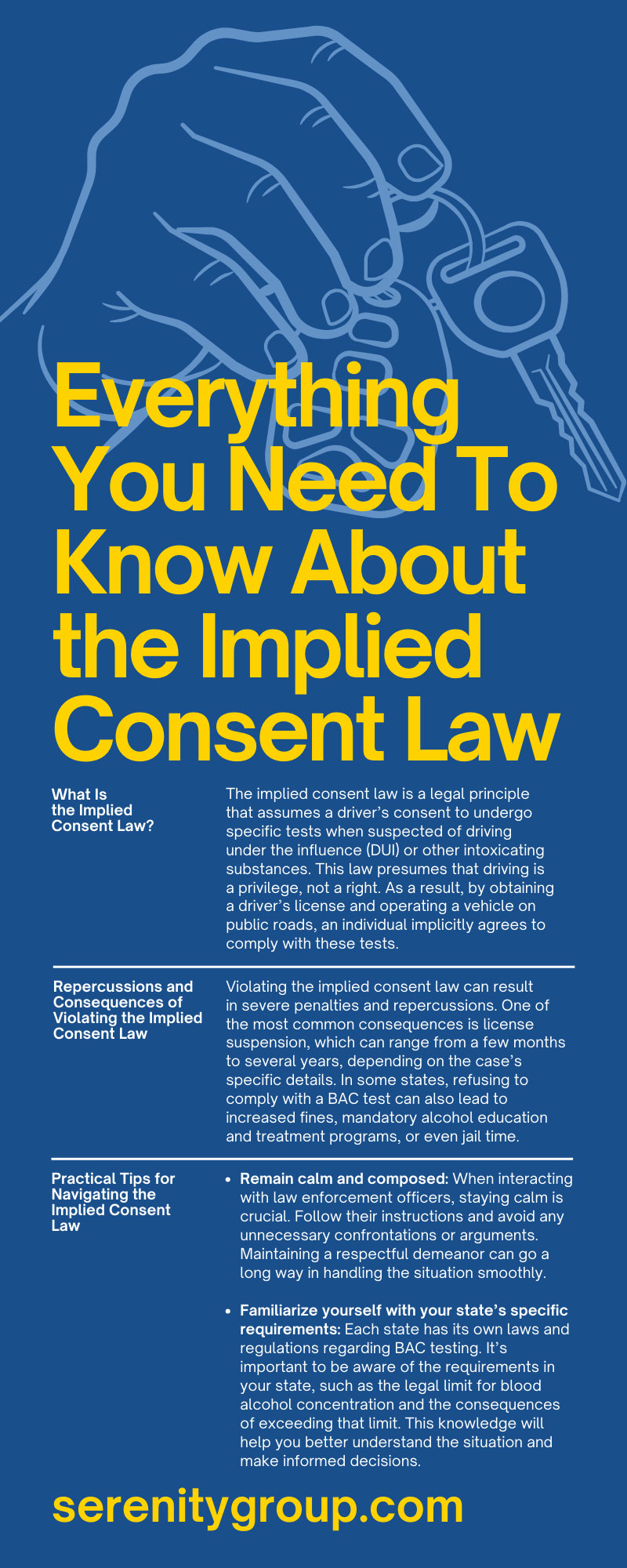Everything You Need To Know About the Implied Consent Law

One aspect of driving laws that has continued to be a significant point of contention is the implied consent law. This law has far-reaching implications for drivers, law enforcement, and insurance companies. In this comprehensive guide, we provide an in-depth analysis of the implied consent law, its effects on society, and the repercussions of violating it.
What Is the Implied Consent Law?
The implied consent law is a legal principle that assumes a driver’s consent to undergo specific tests when suspected of driving under the influence (DUI) or other intoxicating substances. This law presumes that driving is a privilege, not a right. As a result, by obtaining a driver’s license and operating a vehicle on public roads, an individual implicitly agrees to comply with these tests.
The Implied Consent Law Across States and Countries
Though the core concept remains the same, the implied consent law varies across states and countries. In the United States, all 50 states have some form of the implied consent law. However, each state has slightly different stipulations regarding the acceptable tests. For example, while some states mandate blood tests for suspected DUI offenders, others prioritize breath analysis as the primary method for determining an individual’s blood alcohol content (BAC).
Many countries worldwide also have some version of the implied consent law, but they may have different allowable BAC limits, testing methods, and violation penalties.
Effects on Society: The Positive and Negative Aspects
The implied consent law can result in several positive and negative consequences.
Positive Aspects
Enhanced Road Safety
By implementing strict penalties and enforcement measures such as increased fines and license suspensions, this law significantly contributes to making roads safer for everyone. It serves as a strong deterrent to individuals who may consider driving under the influence, ensuring they think twice before putting themselves and others at risk.
Reduced DUI-Related Incidents
The effectiveness of this law is evident in the significant decrease in DUI-related accidents and incidents. By imposing severe consequences for driving under the influence, such as mandatory alcohol education programs and FR-44 insurance requirements, it effectively deters intoxicated individuals from getting behind the wheel. This proactive approach leads to a lower rate of DUI-related accidents and ultimately saves lives.
Easier Prosecution
The implied consent law plays a crucial role in streamlining the prosecution process for DUI offenders. This allows law enforcement agents to collect necessary evidence, such as breath or blood samples, and provides a solid foundation for building a strong legal case against impaired drivers. This streamlined process facilitates legal proceedings and reduces road incidents by ensuring offenders are held accountable for their actions.
Negative Aspects
Privacy Issues
Some critics argue that this law infringes upon an individual’s privacy rights, given that certain tests—such as blood tests—can be invasive. A lack of privacy raises concerns about the misuse of personal medical information and the need for strict regulations to protect privacy in the context of implied consent laws.
Variation in State Laws
Differences in the implied consent law across states and countries can confuse drivers, as they may not know the specific requirements in each jurisdiction. This lack of uniformity can result in unintended legal consequences for drivers who unknowingly violate the law. Therefore, some people argue it’s crucial to establish clearer guidelines and streamline the implied consent law to ensure consistency and mitigate potential confusion and legal issues.
Repercussions and Consequences of Violating the Implied Consent Law
Violating the implied consent law can result in severe penalties and repercussions. One of the most common consequences is license suspension, which can range from a few months to several years, depending on the case’s specific details. In some states, refusing to comply with a BAC test can also lead to increased fines, mandatory alcohol education and treatment programs, or even jail time.
These consequences can also affect one’s auto insurance. Convicted DUI offenders may need to obtain high-risk insurance such as FR-44 insurance, which certifies that they have minimum liability coverage. For instance, you may need to look for FR-44 insurance quotes to find a policy suitable for your situation. Moreover, their insurance premiums will likely increase, and they may even face cancelation of coverage.
Practical Tips for Navigating the Implied Consent Law
Suppose you find yourself in a situation in which police are requesting that you undergo a blood alcohol concentration test under the implied consent law. In that case, knowing how to handle the situation is important. Here are some helpful tips to keep in mind.
- Remain calm and composed: When interacting with law enforcement officers, staying calm is crucial. Follow their instructions and avoid any unnecessary confrontations or arguments. Maintaining a respectful demeanor can go a long way in handling the situation smoothly.
- Familiarize yourself with your state’s specific requirements: Each state has its own laws and regulations regarding BAC testing. It’s important to be aware of the requirements in your state, such as the legal limit for blood alcohol concentration and the consequences of exceeding that limit. This knowledge will help you better understand the situation and make informed decisions.
- Understand the consequences of refusing a BAC test: Understanding the potential consequences of refusing to take a BAC test is essential. In many jurisdictions, refusing a BAC test can result in immediate license suspension, fines, or other legal penalties. Awareness of these consequences can help you make a more informed decision in such a situation.
- Seek legal counsel if necessary: If you believe someone has violated your rights or you’re unsure how to proceed, seeking legal counsel is advisable. An experienced attorney can provide the guidance and support you need to protect your rights and navigate the legal process.
Remember, approaching any interaction involving a BAC test with caution and knowledge is crucial. Being prepared and informed can significantly affect how you handle the situation and protect your rights.
The implied consent law is a crucial aspect of driving laws that has significant consequences for drivers and society. Understanding the nuances of this law in your state or country is essential to ensuring you can comply with its provisions and avoid any legal repercussions.
If you need help recovering from a DUI charge in the state of Virginia, contact us at Serenity Group. We’ll help you find affordable FR-44 insurance quotes in Virginia. Remember, always drive responsibly, and never get behind the wheel if you’ve been drinking—your safety and the safety of others on the road rely on it.


Recent Comments